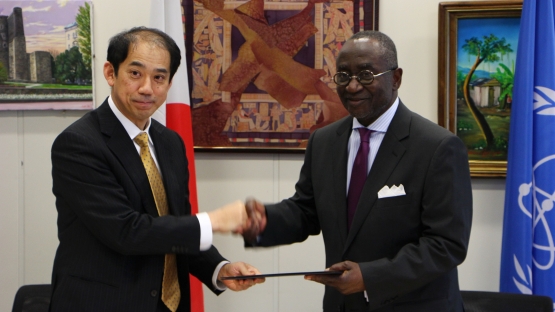Nearly a year has passed since the World Health Organization (WHO) reported a major outbreak of Ebola virus disease (EVD) in Guinea. In the interim, the disease has reached epidemic proportions, reaching casualty rates of up to 70%, and claiming the lives of nearly 10,000 victims across Liberia, Guinea, Sierra Leone, and elsewhere. But new cases of EVD in the region have declined, and a sense of normalcy has returned to the affected countries, implying the outbreak may finally be contained, provided the current international efforts continue until full eradication.
"We have succeeded in averting the worst-case scenarios we feared," explained Secretary-General Ban Ki-Moon in a recent address to the UN General Assembly, "But much important work lies ahead." In keeping with the spirit of the Secretary-General's statement, the IAEA's technical cooperation (TC) programme is taking steps to strengthen regional capacities in the diagnosis of Ebola and other zoonoses, with the help of its Member States.
IAEA technical cooperation projects are funded through the Technical Cooperation Fund (TCF), a voluntary mechanism supported by Member State contributions, extrabudgetary endowments and in-kind contributions. Prior to each biennial programme cycle, funds are allocated to projects in advance to implement the planned activities, i.e. for the 2014-2015 TC cycle, funds were allocated to the programme in late 2013. As the ongoing EVD epidemic erupted in mid-2014, taking the international community by surprise, funds were not set aside to address this critical issue.
With the Agency's need for financial support in mind, IAEA Member States have demonstrated their commitment in support of efforts to tackling Ebola.
On February 23, H.E. Mitsuru Kitano, Ambassador of Japan to the IAEA, presented a pledge letter to Mr Kwaku Aning, Deputy Director General and Head of the Department of Technical Cooperation, at the Agency's Vienna headquarters. The letter affirms Japan's dedication to the fight against Ebola by pledging a financial contribution in support of IAEA activities to enhance capacities of Africa region to anticipate the risks of future zoonotic disease outbreaks, by strengthening Africa's regional capacities with mechanisms for early detection and strategies for sharing related diagnostic and epidemiological information within a regional network.
"This part of the Agency's work is not well-known, but Japan recognizes the importance of this work through its continued support," remarked DDG Aning. His comments were reflected by Ambassador Kitano, who replied, "Indeed, we recognize the Agency's role in this crisis, and the need to develop early detection methods."
In pledging these contributions, Japan will join the United States and the African Regional Cooperative Agreement for Research, Development and Training related to Nuclear Science and Technology (AFRA), both of which have already provided their contribution.


